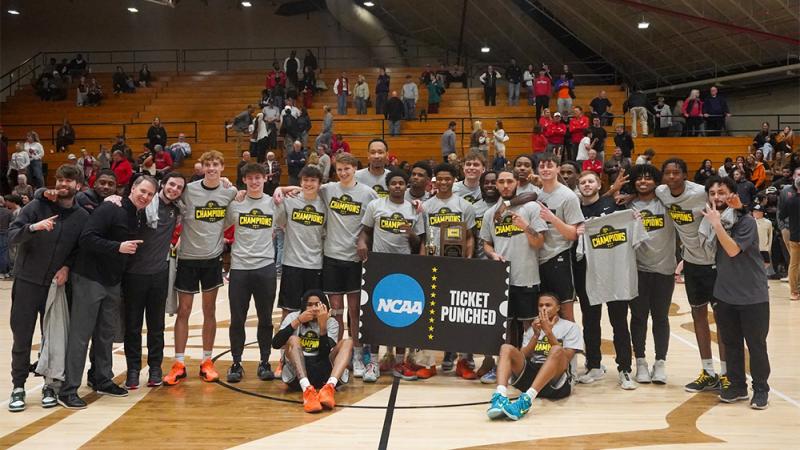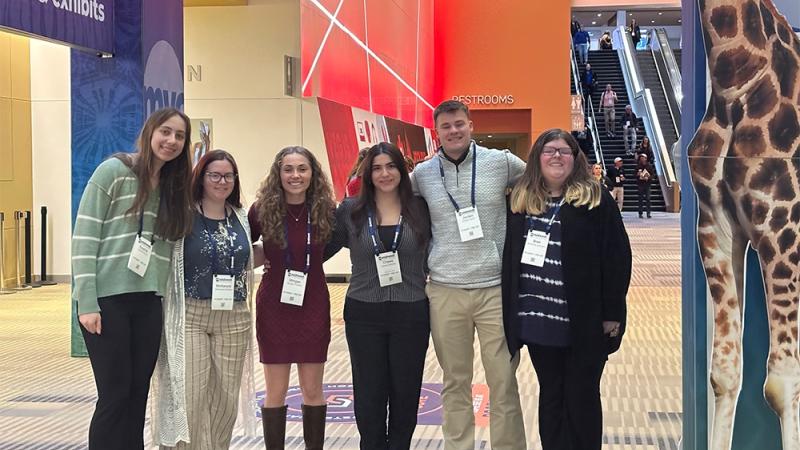Psychology Professor Traci Stark calls it a career with 'Last Lecture'
Thankfully, former ‘Berg Chaplain Paul Stark has embraced his role of “driving Miss Traci,” broken leg and all. Otherwise, Traci Stark’s HU colleagues wouldn’t have had the opportunity to hear her “Last Lecture” last Thursday afternoon.
Traci is retiring as a professor of psychology after 20 years at the ‘Berg. Provost Courtney DeMayo Pugno invited her to return to campus to deliver her “Last Lecture” after teaching virtually this semester. It was an opportunity for her to share her wisdom, reflect on her career and impart important lessons to all of us. Traci titled her talk “Three Things: Lessons on Lerner, Learning and Living.”
On memories and shenanigans …
Our resident “South Park-ologist” launched into a series of humorous reminiscences by recalling her job interview at Heidelberg as “the worst day ever,” describing Heidelberg as “the weirdest place ever.” But it grew on her. A clinical psychologist by trade, she recalled faculty lunches in Rock Creek Café, breaking her leg (again) by stepping on an acorn (or was it a walnut?) on campus, and attending the College World Series in Appleton, Wisconsin, as the faculty rep to the OAC.
There were all kinds of shenanigans with her “work spouse” Dr. Marc O’Reilly and a revelation that Dr. Julie O’Reilly “is the funniest person on campus,” epic progressive Christmas dinners with colleagues, and the highly recommended Berg Bourbon Club.
Traci recalled that the Psychology Department faculty’s Halloween celebrations are the stuff legends are made of, including her favorite group costume as the cast of the Breakfast Club. “But when Aaron (Sell) joined the faculty, we had to go dark,” she joked.
On teaching and learning …
Although Traci said she “never felt like much of an intellect,” her love of people – especially young people – has sustained her throughout her career. “There’s nothing better than seeing young people grapple with difficult concepts and then figure them out,” she said.
Those unknowns are also gripping the landscape of higher education today, with so many unanswered questions and issues unfurling before us. “What I do know,” Traci said, “is one of the keys to being a successful student and being happy in life is being willing to learn new things … technology, gadgets, theories, genres.”
She also knows the value of hard work, which hasn’t changed over generations. “You can’t do anything unless you do the work. And you know what? Learning is fun!”
On judgments and assumptions…
In professor mode, Traci touched on a pair of psychology theories – the Just-World Theory and the Fundamental Attribution Theory – and implications of both on people’s empathy and happiness.
Melvin Lerner’s Just-World Theory postulates that the world is fair and just and that individuals get what they deserve. This theory can lead to people blaming victims for their misfortune or injustice, leading to the belief that the world is essentially predictable and controllable.
Some social scientists believe that the Just World Theory is a predictor of the Fundamental Attribution Error. The latter is explained as a bias in which we attribute someone’s actions not to their circumstances or situation but to their character and personality, leading us to misjudge them and their actions.
The results of both theories, according to Traci, are counterproductive. “Bad things happen all the time, to good and bad people,” she said. “The most important thing to learn is why.”
Assumptions cloud our ability to give people the benefit of the doubt. “Judging can leave us feeling powerful and cynical but prevent us from considering positive changes and solutions,” she said. “What if solutions to society’s problems are a lot less complicated than we think? … If you don’t assume the worst, you are happier.”
On loss and living well …
Traci shared with colleauges a few things she has witnessed in life:
“The longer you live, the more you will be defined by how you handle loss.” The secret to navigating loss and finding happiness is “learning to and being allowed to grieve.” Walking through grief with family, friends and colleagues helps us put one foot in front of the other and make meaningful connections.
The bottom line is to live well, love deeply and learn to let go. She paraphrased Vietnamese Buddhist monk Thich Nhat Hanh, the global spiritual leader and peace and mindfulness activist, saying, “In the end, the only question is, ‘How much did you love?’”
“I wish all of you a gentle, fulfilling life … a life of learning.”
A distinguished career …
Traci joined the Heidelberg faculty in 2004. She taught and mentored countless students, supported her faculty colleagues and served Heidelberg in many capacities. Among her accomplishments are leading nine students on a summer course at Oxford University and serving as the Faculty Representative to the Ohio Athletic Conference for more than 15 years. She was the recipient of the 2019-20 Jane Frost Kalnow Professorship in the Humanities and the 2023-24 Faculty Service Award.




